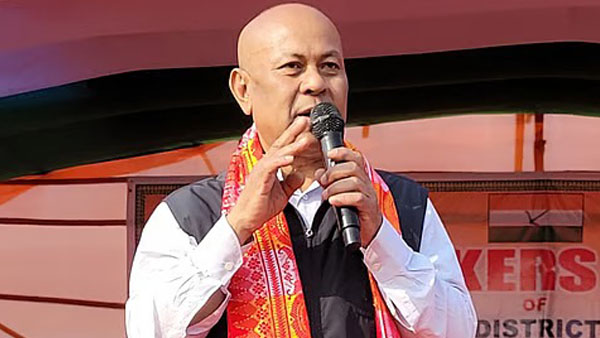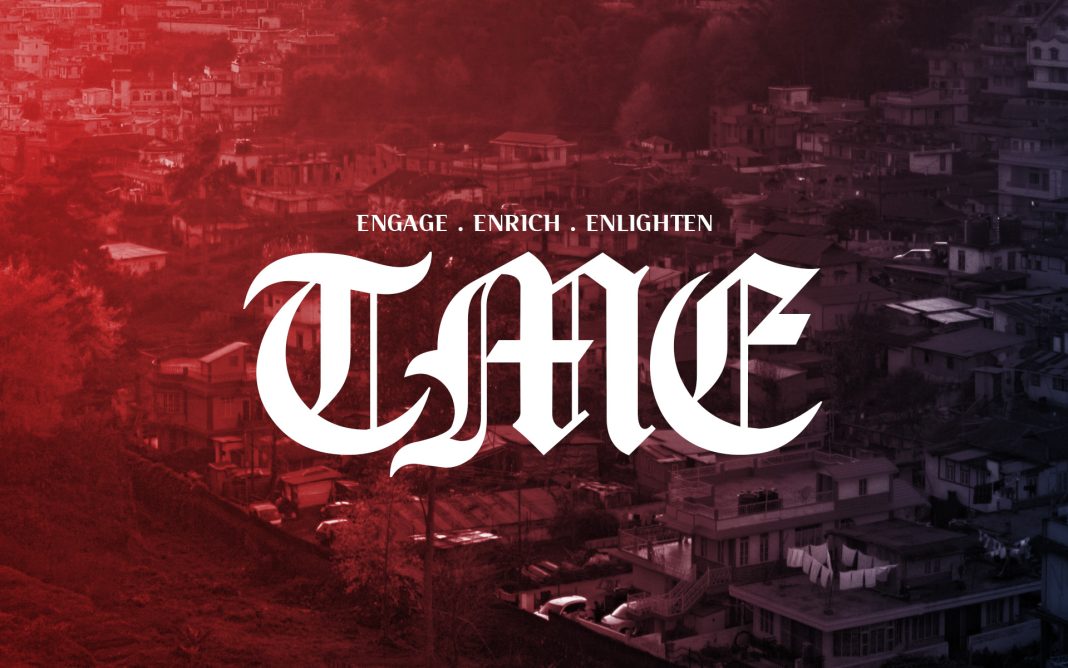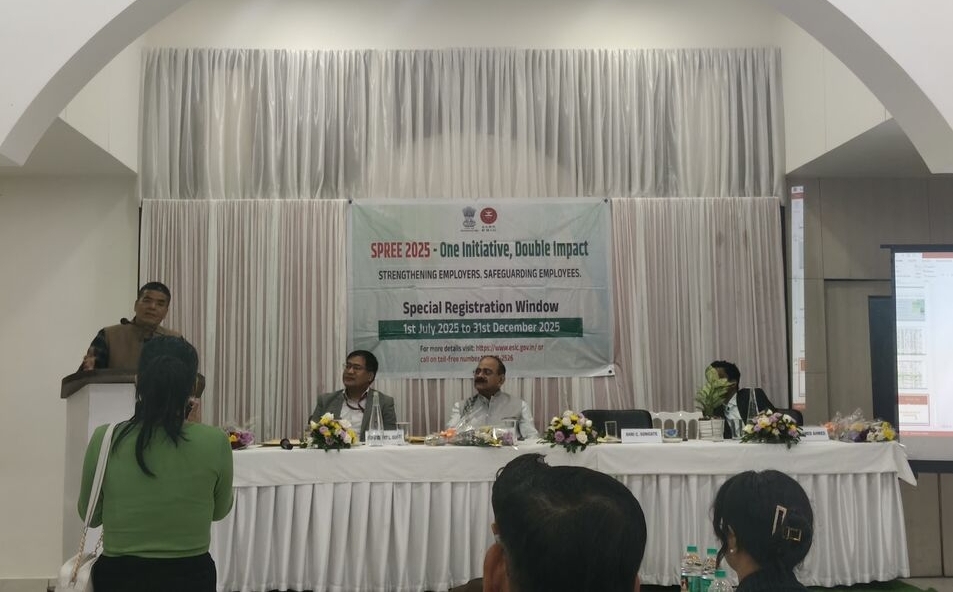By Dipak Kurmi
In the evolving political history of Assam’s Bodoland Territorial Region (BTR), the resounding comeback of Hagrama Mohilary marks not merely a return of a leader but the resurgence of a legacy deeply intertwined with the aspirations, struggles, and hopes of the people. On October 5, 2025, Hagrama Mohilary is set to be sworn in as the Chief of the Bodoland Territorial Council (BTC) at a solemn ceremony in Bodofa Nwgwr, Kokrajhar. This event, steeped in symbolism and emotion, represents the culmination of a remarkable political revival, as the Bodoland People’s Front (BPF) secured 28 of the 40 constituencies in the recently concluded 5th BTC Legislative Council elections.
This victory, both emphatic and historic, signals a shift in the political winds of the BTR, reaffirming faith in a leader who had earlier governed for 17 consecutive years before facing a five-year hiatus from power. The people’s mandate, delivered through the verdict of September 22, reestablishes Hagrama Mohilary’s centrality in the political and developmental discourse of the region, while sending a clear message about their expectations for peace, progress, and inclusive growth.
A Historic Return to Power
Hagrama Mohilary’s return to power is not merely a political event—it is a moment of renewal for a region that has witnessed multiple phases of transition, reconciliation, and hope. After being unseated in the 2020 BTC elections by the United People’s Party Liberal (UPPL), led by Pramod Boro, Hagrama’s BPF faced its toughest phase. Yet, in true democratic spirit, he embarked on a tireless campaign over the past five years, reconnecting with grassroots sentiments, reorganising the party’s structure, and rebuilding lost trust. His ability to read the pulse of the people, coupled with a forward-looking developmental vision, has now culminated in a resounding electoral revival.
The mandate reflects not only the popularity of Hagrama Mohilary but also the maturity of the democratic process in the BTR. Voters across Kokrajhar, Chirang, Baksa, Udalguri, and Tamulpur came out in large numbers to cast their ballots peacefully, reaffirming Bodoland’s commitment to democracy. The State Election Commission and the electorate together deserve praise for ensuring a transparent, peaceful, and participatory election—an achievement that underscores Assam’s robust democratic tradition.
The Oath of Reverence and Resolve
The oath-taking ceremony, scheduled for October 5 at 11 AM at the BTC Secretariat Park, Bodofa Nwgwr, will be graced by the Hon’ble Governor of Assam, Shri Lakshman Prasad Acharya, and the Hon’ble Chief Minister, Dr. Himanta Biswa Sarma. The Chief Secretary, Dr. Ravi Kota, will administer the oath of office to Hagrama Mohilary and the newly elected members of the Executive Council.
Before assuming office, Hagrama and the newly elected members will pay homage to the tomb of Bodofa Upendranath Brahma at Dotma—an act laden with symbolism, reverence, and continuity. Floral tributes will also be offered at the Bodoland Martyrs’ Cemetery in Debargaon and at the statue of Bodofa U N Brahma in front of the BTC Legislative Assembly building. These gestures are not ceremonial formalities but profound affirmations of Bodoland’s moral compass—rooted in the ideals of self-determination, peace, and unity for which countless lives were sacrificed.
The Five Guarantees: A Blueprint for Inclusive Development
Central to Hagrama Mohilary’s campaign and his renewed governance agenda are his “Five Guarantees,” each designed to address long-standing socio-economic concerns and ensure equitable development across the region. These guarantees are not political rhetoric but carefully crafted commitments intended to transform the developmental landscape of Bodoland.
Land Rights for the Landless
At the heart of Bodoland’s socio-political struggles lies the question of land. Hagrama Mohilary has pledged to resolve this issue by granting land pattas to all landless families across communities, based on the 2005 voter list. A comprehensive land survey, in line with the BTC Accord, will be undertaken to identify eligible beneficiaries. By doing so, his administration aims to ensure land security, social justice, and inclusion—restoring dignity to thousands of marginalized families. This measure holds immense potential to stabilize the rural economy, prevent displacement, and integrate all communities into the region’s developmental narrative.
Empowering Youth through Employment
Recognizing that the future of Bodoland rests on its youth, Hagrama has announced an annual fund of Rs 100 crore for promoting self-employment and entrepreneurship. This initiative seeks to transform unemployment from a challenge into an opportunity by empowering young people with skills, resources, and capital. By encouraging start-ups, agricultural enterprises, and small-scale industries, the scheme could redefine the economic landscape of the BTR, channeling youthful energy toward productive avenues.
Dignity for Senior Citizens and the Specially Abled
Inclusivity forms the cornerstone of Hagrama’s governance philosophy. An annual fund of Rs 10 crore will be dedicated to supporting senior citizens and specially abled individuals. This social security scheme aims to extend dignity, care, and financial support to sections often left at the margins of policy frameworks, reinforcing the humane dimension of governance.
Women’s Empowerment and Self-Reliance
Women have always played a pivotal role in Bodoland’s socio-economic fabric. To strengthen their participation in the region’s progress, Hagrama Mohilary has promised an annual allocation of Rs 40 crore to support women’s self-help groups and entrepreneurship initiatives. The fund will be channelled into capacity building, micro-credit facilities, and income-generating activities designed to make women economically independent and socially empowered.
Support for the Economically Weaker Sections
To address poverty and inequality, an annual provision of Rs 50 crore will be allocated for economically weaker households. This financial support will help uplift marginalized families through direct assistance for housing, healthcare, education, and livelihood. The scheme represents a broader commitment to social equity and balanced development.
Together, these five guarantees outline a governance framework that blends welfare with empowerment and compassion with pragmatism. They reflect a vision of Bodoland where prosperity does not remain the privilege of a few but becomes a shared reality for all.
The Changing Political Dynamics
The 2025 BTC election was a fascinating study in democratic competition. Throughout the campaign, the UPPL, led by Pramod Boro, projected confidence that it would retain voter trust, while Hagrama’s BPF mounted a spirited and strategically sharp campaign. The Bharatiya Janata Party (BJP), meanwhile, maintained an intriguing neutrality, declaring that whichever party—UPPL or BPF—emerged victorious, it would ultimately benefit the BJP’s broader political objectives.
Political analysts suggest that the division of votes between the UPPL and BJP may have contributed to the BPF’s landslide victory. While partially true, this explanation overlooks deeper undercurrents. The voters’ yearning for experienced leadership, stability, and local accountability played a decisive role. The BPF’s grassroots connect, coupled with Hagrama’s proven administrative record, struck a chord with voters who desired continuity with reform.
The UPPL’s five-year tenure under Pramod Boro, though marked by several commendable initiatives—such as efforts to normalize post-insurgency conditions and foster inter-community trust—appears to have left parts of the electorate seeking more tangible outcomes. In many ways, the verdict represents both gratitude for progress and a demand for renewed momentum.
Towards Consensus and Cooperation
The composition of the new BTC Assembly offers a unique opportunity to build a model of consensus governance. The BPF’s dominant majority, combined with the presence of the UPPL and BJP, could facilitate an opposition-less council where decisions are taken collectively, reflecting the shared aspirations of all communities. Such a cooperative framework could become a benchmark for regional governance across India, where consensus overrides conflict and collective development supersedes partisan divides.
The BJP, as a major player in Assam’s political landscape, now finds itself in a position to act as a bridge between the two dominant regional forces. Its role in promoting ethnic harmony, safeguarding indigenous rights, and combating demographic challenges remains crucial. The “silent demographic invasion” by migrants from erstwhile East Bengal, East Pakistan, and present-day Bangladesh remains a sensitive issue. Protecting the land and resources of indigenous people through strict enforcement of land laws and anti-encroachment measures has been a central feature of the BJP-led alliance government in Dispur. Aligning these state-level initiatives with the BTC’s local governance could yield transformative outcomes for the region’s socio-economic stability.
A Vision for Peace and Progress
In his public addresses, Hagrama Mohilary has reiterated that the five guarantees are only the beginning of a larger developmental roadmap. His vision encompasses sustainable peace, economic growth, and social harmony—pillars essential for Bodoland’s long-term progress. “I will take decisive steps to resolve the key issues concerning our people, ensuring that Bodoland emerges as a region of peace, prosperity, and sustainable development for all,” he affirmed during the campaign.
This statement resonates deeply in a region that has journeyed from insurgency to peace, from isolation to inclusion. Hagrama’s past tenure witnessed significant infrastructure development, expansion of education and healthcare, and the strengthening of local governance institutions. Building upon these foundations, his new term is expected to focus on sustainable livelihoods, agricultural modernization, ecological preservation, and digital governance—key drivers of contemporary progress.
The Road Ahead
As the people of Bodoland prepare to witness Hagrama Mohilary take the oath of office, there is a palpable sense of optimism. The victory is not merely a restoration of leadership but a renewal of trust between the people and their representative institutions. It signifies hope—hope for better governance, deeper inclusivity, and enduring peace.
The Bodoland movement, rooted in decades of struggle and sacrifice, has evolved from a quest for autonomy to a mission for holistic development. Hagrama Mohilary’s return to power reaffirms that the spirit of Bodoland remains alive—resilient, adaptive, and forward-looking. The symbolic acts of homage at the tomb of Bodofa Upendranath Brahma and the Martyrs’ Cemetery encapsulate this spirit of continuity, reminding all that leadership in Bodoland is not about power alone but about duty to a shared cause.
The verdict of the 2025 BTC elections, delivered with overwhelming clarity, embodies Assam’s enduring democratic ethos. The participation of all parties, the peaceful conduct of the elections, and the collective responsibility shown by voters are exemplary. The task ahead now is to translate this democratic success into developmental dividends.
As Bodoland steps into a new era under Hagrama Mohilary’s leadership, the challenge will be to harmonize tradition with transformation, ensuring that every community, every household, and every individual becomes a stakeholder in the region’s progress. The five guarantees, if implemented with transparency and accountability, could well redefine the socio-economic fabric of the BTR, transforming it into a model of inclusive governance.
In the final analysis, Hagrama Mohilary’s resurgence symbolizes more than political victory—it represents the triumph of perseverance, the return of stability, and the reaffirmation of faith in democratic renewal. The oath on October 5 will thus not only mark the beginning of a new government but also the dawn of a new chapter in Bodoland’s journey—one written with hope, built on unity, and guided by the timeless dream of peace and prosperity for all.
(the writer can be reached at dipakkurmiglpltd@gmail.com)




